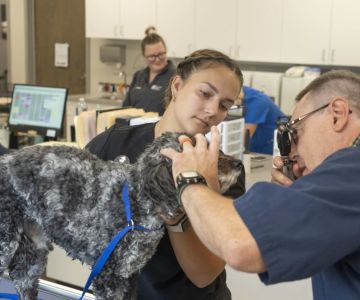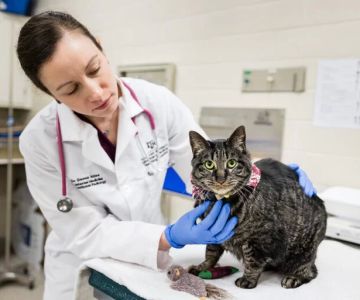1. Introduction to Veterinarian Salaries
When considering a career in veterinary medicine, one of the first questions that often arises is: "How much do veterinarians make?" Veterinarians play an essential role in the well-being of animals, and their expertise is needed in various fields such as animal clinics, hospitals, and even research. The question of a veterinarian's yearly salary is influenced by several factors, such as location, education, specialization, and years of experience.
In this article, we will delve into what influences the salary of veterinarians in 2025, the average earnings they can expect, and the factors that might affect their overall compensation. Whether you're considering this career or are just curious about how veterinarians are compensated, this guide will help you understand the landscape of veterinary salaries today.
2. Average Salary for Veterinarians in 2025
The average yearly salary of a veterinarian can vary significantly depending on their location, specialization, and experience. As of 2025, veterinarians in the U.S. earn an average salary of around $95,000 annually. However, this figure is just an average, and many factors can influence a veterinarian’s income.
2.1 Factors Influencing Veterinarian Salaries
Several key factors contribute to determining a veterinarian's salary. The most significant include the geographic location of the practice, the specific field of veterinary medicine, and the level of experience. Let’s explore each of these factors in more detail:
2.2 Geographic Location
Veterinarians practicing in urban areas typically earn higher salaries than those in rural areas due to the cost of living and demand for veterinary services. For example, veterinarians in cities like New York, Los Angeles, or Chicago may earn significantly more compared to those in smaller towns or rural regions. The concentration of specialized veterinary services also plays a role in salary discrepancies across locations.
2.3 Specialization
Specializing in a particular field of veterinary medicine can lead to higher earnings. Veterinarians who specialize in fields like surgery, cardiology, or dermatology often earn more than general practitioners. Specialized veterinarians are in high demand and are able to command a premium for their expertise. On the other hand, general veterinarians working in animal shelters or small clinics may have a lower salary, but often enjoy more regular working hours.
2.4 Experience and Education
As in many professions, experience matters. Newly graduated veterinarians typically start at a lower salary, but with years of practice, they can see substantial increases. According to recent data, veterinarians with less than 5 years of experience earn an average of $80,000, whereas those with over 20 years of experience can make upwards of $120,000 annually. Further, veterinarians who have completed internships or residencies in specialized fields also tend to earn more due to their advanced training.
3. The Impact of Practice Type on Salary
The type of veterinary practice also greatly impacts a veterinarian’s yearly salary. Let’s take a closer look at how different practice types affect pay:
3.1 Private Practice vs. Corporate Employment
Veterinarians working in private practices may have different salary structures compared to those employed by larger veterinary corporations or universities. Private practice owners tend to earn more, as they may have higher profits from their business. However, those working for large chains or corporate practices often receive benefits such as health insurance and retirement plans, which can add significant value to their compensation packages.
3.2 Working for Animal Shelters vs. Private Clinics
Veterinarians who work for animal shelters or nonprofit organizations may earn less than those who work in private clinics. While these jobs are incredibly rewarding and allow veterinarians to help animals in need, they often offer fewer financial incentives compared to for-profit practices.
3.3 Emergency and Specialty Clinics
Veterinarians working in emergency or specialty clinics often work long hours, including nights and weekends. As a result, they may earn higher salaries due to the nature of their work. Specializing in critical care, surgery, or oncology can bring a higher pay grade, and emergency room veterinarians are generally compensated for the demands of their jobs.
4. How Much Do Veterinarians Make by Specialty?
Specialization plays a big role in determining a veterinarian’s salary. Let’s take a look at how much veterinarians earn in some of the most popular and lucrative specialties:
4.1 Small Animal Veterinarians
Small animal veterinarians, typically focused on pets like dogs and cats, make up a large portion of the veterinary workforce. On average, small animal veterinarians earn around $90,000 annually, but this figure can increase significantly with experience or specialized skills.
4.2 Large Animal Veterinarians
Veterinarians who specialize in large animals, such as horses, cows, and other livestock, often work in rural settings or with farms. Their salaries can vary, but they generally earn between $80,000 and $100,000 annually, depending on their location and the type of practice they work in.
4.3 Veterinary Surgeons and Specialists
Veterinary surgeons and specialists, including those focusing on orthopedics, dermatology, or cardiology, can earn significantly more than general practitioners. Their salaries can range from $120,000 to $200,000 or more, depending on their expertise and reputation in the field. This specialization requires extensive additional training but offers high earning potential for those willing to invest the time.
5. Benefits and Perks Beyond Salary
In addition to their salaries, many veterinarians receive benefits that enhance their overall compensation. These benefits can significantly improve the financial and personal well-being of veterinary professionals:
5.1 Health and Dental Insurance
Many veterinary practices and corporate employers offer comprehensive health and dental insurance to their employees. This benefit is crucial for veterinarians, as they often face the physical demands of the job, and having access to affordable healthcare is essential.
5.2 Retirement Plans and Bonuses
Retirement benefits, such as 401(k) plans, are also common in the veterinary field. Some employers may match contributions to retirement plans, and veterinarians working in larger corporate practices may even receive performance bonuses or profit-sharing options, adding to their overall compensation package.
5.3 Job Satisfaction and Personal Fulfillment
Although not a direct monetary benefit, job satisfaction is an important aspect of a veterinarian's overall compensation. Many veterinarians find personal fulfillment in helping animals and building long-lasting relationships with pet owners. This sense of purpose and passion for animal care is often cited as a key factor in the decision to enter and remain in the profession.
6. How Hidden Brook Veterinary Can Support Your Career
If you're considering a career in veterinary medicine or are already working in the field, Hidden Brook Veterinary offers resources and opportunities to help you advance your career. From educational programs to job opportunities and professional networking, we’re here to support you in every step of your journey. Explore our services and learn more about how we can help you grow professionally in the veterinary field.











